Related Research Articles
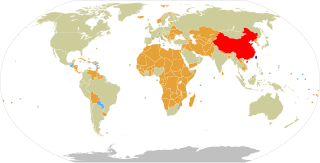
The Republic of China (ROC), often known informally as Taiwan, currently has formal diplomatic relations with 12 of the 193 United Nations member states and with the Holy See, which governs Vatican City, as of 1 August 2023. In addition to these relations, the ROC also maintains unofficial relations with 59 UN member states, one self-declared state (Somaliland), three territories (Guam, Hong Kong, and Macau), and the European Union via its representative offices and consulates under the One China principle. The Government of the Republic of China has the 31st largest diplomatic network in the world with 110 offices.
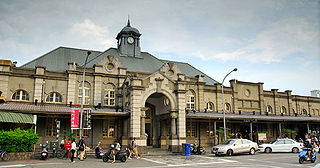
Taiwan Province is a nominal administrative division of the Republic of China (ROC). The province remains a titular division as a part of the Constitution of the Republic of China, but it is no longer considered to have any administrative function practically.
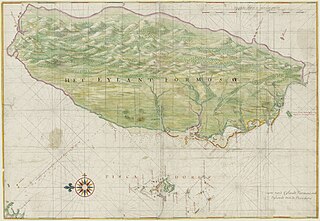
As a result of the surrender and occupation of Japan at the end of World War II, the islands of Taiwan and Penghu were placed under the governance of the Republic of China (ROC), ruled by the Kuomintang (KMT), on 25 October 1945. Following the February 28 massacre in 1947, martial law was declared in 1949 by the Governor of Taiwan, Chen Cheng, and the ROC Ministry of National Defense. Following the end of the Chinese Civil War in 1949, the ROC government retreated from the mainland as the Chinese Communist Party (CCP) proclaimed the establishment of the People's Republic of China. The KMT retreated to Taiwan and declared Taipei the temporary capital of the ROC. For many years, the ROC and PRC each continued to claim in the diplomatic arena to be the sole legitimate government of "China". In 1971, the United Nations expelled the ROC and replaced it with the PRC.
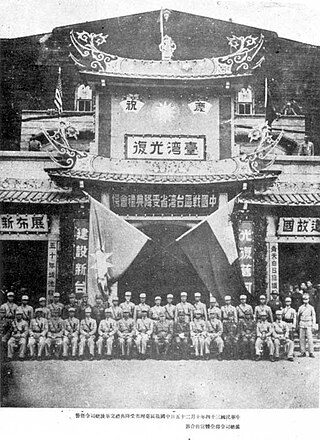
Retrocession Day is the name given to the annual observance and a former public holiday in Taiwan to commemorate the end of Japanese rule of Taiwan and Penghu, and the claimed retrocession ("return") of Taiwan to the Republic of China on 25 October 1945. However, the idea of "Taiwan retrocession" is in dispute.
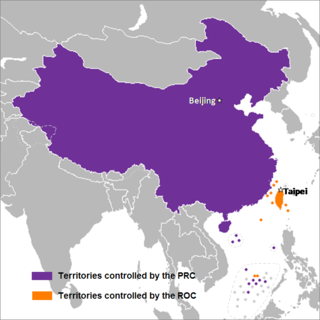
The term "Two Chinas" refers to the geopolitical situation where two political entities exist under the name "China".

Oceania is, to the People's Republic of China and the Republic of China, a stage for continuous diplomatic competition. The PRC dictates that no state can have diplomatic relations with both the PRC and the ROC. As of 2019, ten states in Oceania have diplomatic relations with the PRC, and four have diplomatic relations with the ROC. These numbers fluctuate as Pacific Island nations re-evaluate their foreign policies, and occasionally shift diplomatic recognition between Beijing and Taipei. The issue of which "Chinese" government to recognize has become a central theme in the elections of numerous Pacific Island nations, and has led to several votes of no-confidence.
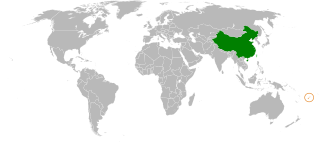
The Republic of the Fiji Islands was the first Pacific Island country to establish diplomatic relations with the People's Republic of China, in 1975. China established an embassy in Fiji in 1976, and Fiji opened its embassy in China in 2001.
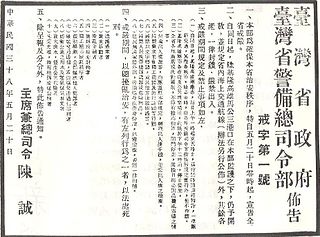
Martial law in Taiwan refers to the periods in the history of Taiwan after World War II, during control by the Republic of China Armed Forces of the Kuomintang-led regime. The term is specifically used to refer to the over 38-year-long consecutive martial law period between 20 May 1949 and 14 July 1987, which was qualified as "the longest imposition of martial law by a regime anywhere in the world" at that time.
Stephen S. F. Chen is a Taiwanese politician.
Events from the year 2007 in Taiwan, Republic of China. This year is numbered Minguo 96 according to the official Republic of China calendar.

Taiwan–Vietnam relations are conducted on an unofficial level, as Hanoi adheres to a one-China policy and officially recognises the People's Republic of China only. However, this has not stopped bilateral visits, immigration and investment capital between Taiwan and Vietnam. Taiwan has been the fourth largest source of foreign direct investment in Vietnam since 2006. Both countries maintain representative offices; Taiwan is represented by the Taipei Economic and Cultural Office in Hanoi and Ho Chi Minh City (Saigón), while Vietnam is represented by the Vietnam Economic and Cultural Office in Taipei, both acting as de facto embassies. Vietnam is, to date, the only communist state to have relations with Taiwan.

Order of Brilliant Star is a civilian order of the Republic of China (Taiwan) recognizing outstanding contributions to the development of the nation. The order is instituted in 1941 and can be awarded to both domestic and foreign nationals.

The Taipei Economic and Cultural Representative Office in the United States represents the interests of Taiwan in the United States in the absence of formal diplomatic relations, functioning as a de facto embassy. Its counterpart in Taiwan is the office of the American Institute in Taiwan (AIT) in Taipei.

The Republic of China (ROC) and Lithuania established diplomatic relations in 1921, three years after Lithuania's declaration of independence in 1918. The relations continued until the Soviet occupation of the Baltic states in 1940. The ROC did not recognise the Soviet annexation of Lithuania. The ROC lost the vast majority of its territory, namely mainland China, to the People's Republic of China (PRC) in 1949, and it has been limited to the island of Taiwan, formerly a Japanese colony and minor associated islands since the 1950s. Democratic Lithuania and modern-day ROC established unofficial diplomatic relations in 2021, thirty-one years after the restoration of Lithuania's independence in 1990.

Nauru-Taiwan relations are relations between the Republic of Nauru and Taiwan.
References
- ↑ Embassy of the Republic of China (Taiwan), Majuro,
- ↑ Ministry of Foreign Affairs of the People's Republic of China Chinese Ambassadors to Marshall Islands, , 驻马绍尔群岛共和国历任大使,
- ↑ ROC and the Marshall Islands established diplomatic relations on November 20, 1998,
- ↑ Gary Song-Huann Lin
- ↑ Lien-Genen Chen
- ↑ Bruce J.D. Linghu
- ↑ George T.K. Li
- ↑ Winston Wen-yi Chen
- ↑ Daniel D. W. Tang